#Judicial Review Claim
Text
Judicial Review: Pre-Action Protocol
Embarking on the journey of challenging a decision made by the Home Office can be a complex and daunting endeavour. Whether it’s about obtaining entry clearance, leave to remain, or settlement rights, individuals often find themselves entangled in legal intricacies. Understanding the Pre-Action Protocol is crucial in navigating this process smoothly. This protocol, enshrined within the Civil…

View On WordPress
#Administrative Review#Appeal#Best Immigration Solicitors London#civil procedure rules#David J Foster & Co#David J Foster & Co Solicitor#DJF Solicitors#Home Office#Home Office Updates#Immigration Judicial Review#Immigration Judicial Review Application#Immigration Lawyers London#Judicial Proceedings#Judicial Review#Judicial Review Application#Judicial Review Claim#Letter Before Claim#Lexvisa#London Immigration Solicitors#PAP#Permission for Judicial Review#Pre Action Protocol#UK Immigration#UK Immigration Advice#UK Immigration Solicitors/ Lawyers#Upper Tribunal#Upper Tribunal Appeal
0 notes
Photo

So like on twitter, this artist have a great idea to draw ourselves very elegant for today
SO HERE I AM
ANYWAY IM SO EXCITEDDDDDDDDDDDDDDDDDDDDDDDDD
VAMONOSSSSSSSSSSSSSSSS GANAMOS HOY GENTE
#bombon's art#can yall tell how much i love saturation#I LITERALLY HAVE A MIDTERM TOMORROW HELP#I HAVE BEEN NOTHING BUT A BALL OF ENERGY EVERY WAKING MOMENT#BOTH FROM EXCITEMENT AND ANXIETY#THAT AND ALSO IM RUNNING ON BOBA MILK TEA#IMBGVFDSFGHJKLKJHGFDFGHJKJHGFDFGHJ#mi exam: to establish standing to sue for judicial review a party must address...#yo: ¿cómo?#la respuesta es primary jurisdiction and claim construction btw#my law prof would either be so proud of me or so disappointed#qsmp#galaqsmp
18 notes
·
View notes
Text

In 2017 I interviewed Bernadette Wren, then head of psychology at the Tavistock Gids clinic, and asked what effect puberty blocking drugs have on the adolescent brain. Looking highly uncomfortable, she replied that the evidence so far was only anecdotal but that the clinic would study its patients “well into their adult lives so that we can see”.
Even back then, before whistleblowers had exposed the rush to medically transition children, it was alarming to hear that heavy-duty GnRH agonists such as triptorelin — used to treat advanced prostate cancer and “chemically castrate” sex offenders — were being prescribed to arrest puberty in hundreds of children as young as 11.
Moreover, they were being used “off-label” before any clinical trials. And the long-term study Wren promised never materialised: Gids (the Gender Identity Development Service) routinely lost touch with patients, and the 44 it did follow reported little long-term mental health improvement.
This shocking chapter in medical history, where the ideological objectives of trans rights campaigners trumped the welfare of disturbed children, is coming to an end worldwide. The decision by NHS England effectively to ban the prescription of puberty blockers comes after the Cass review noted these drugs could “permanently disrupt” brain development, reduce bone density and lock children into a regime of cross-sex hormones requiring life-long patienthood.
NHS England unites with other national health services including those in Finland, France, Sweden and, most notably, the Netherlands — where the “Dutch protocol”, a regime of early blockers then hormones, was devised in 1998 — in pulling back from prescribing them.
Even in the United States, where a toxic combination of extreme activism and medical capitalism has pushed child gender medicine to grotesque extremes, with double mastectomies performed on 14-year-old girls, there is some retrenchment.
Leaks from the World Professional Association for Transgender Health, the body which formulates guidance on “trans healthcare”, reveal doctors perplexed at how they should explain to an 11-year-old child that drugs will render them infertile. Crucially, liberal media such as The New York Times are now reporting grave medical misgivings about child transition, once dismissed as a culture-war issue for the Republican right.
Yet the question remains: how was this ever allowed to happen? For years, puberty blockers were cheerily billed as a mere “pause button”. In 2014, Dr Polly Carmichael, the last head of Gids before the Cass review ordered its closure, went on CBBC in a show called I Am Leo, saying of blockers: “The good thing is, if you stop the injections, it’s like pressing ‘start’ and the body carries on developing as it would if you hadn’t started.”
The BBC permitted her to make this unevidenced claim to an impressionable audience of six to 12-year-olds. Imagine hearing this as a developing girl, freaked out by your new breasts and periods. No wonder Gids referrals subsequently rocketed.
Carmichael failed to mention that she did not know if pressing “restart” on puberty is always medically possible — it is not — and in fact, almost every child Gids put on blockers went on to irreversible cross-sex hormones.
After years in a Peter Pan state while their peers developed, they understandably felt there was no way back and forged on with treatment. Yet if allowed to experience natural puberty, almost 85 per cent of gender dysphoria cases resolve themselves.
Nor did Carmichael tell CBBC kids that the blockers-hormones combination, if taken early enough, not only results in sterility but kills the libido so that a young person will never experience an orgasm.
At the 2020 judicial review brought by a former Tavistock clinician and Keira Bell, the brave young detransitioner rushed onto hormones by Gids, judges expressed astonishment at Gids’s lack of an evidence base.
Reporting on this issue for seven years, I too have been struck by a complete clinical incuriosity. Not only was data not collected, but those who queried treatments or pressed for evidence faced angry condemnation. Perhaps activists knew what research might find because one long-term Finnish study, recently reported in the BMJ, destroyed the myth used to justify blockers: that a child will commit suicide if denied them.
The Finns found that “gender-affirming care” does not make a dysphoric child less suicidal. Rather, such children had the same suicide risk as others with severe psychiatric issues. In other words, changing bodies does not fix troubled minds.
Yet even after NHS England’s announcement, activists refuse to heed the now-overwhelming evidence. In its response, Stonewall persists with the myth that puberty blockers “give a young person extra time to evaluate their next steps”.
Many questions remain unanswered: will private clinics still be permitted to prescribe puberty blockers; and is Scotland’s Sandyford child gender clinic still determined to close its ears to all evidence? Plus, we have few details on how the NHS’s new “holistic” treatment for gender-questioning children will operate when it opens next month.
This repellent experiment — in which girls who like trucks or little boys who dress as princesses, and who invariably grow up to be gay, are corralled inexorably down a road towards life-changing treatments — belongs in the book of medical disgraces. As do the cheerleaders who raised money for Mermaids and those who persecuted whistleblowers or damned journalists asking questions as transphobic.
In 50 years, chemically freezing the puberty of healthy children with troubled minds will be regarded with the same horrified fascination as lobotomies — which, never forget, won the Portuguese neurologist Antonio Egas Moniz the 1949 Nobel prize.
--------------------
{Article source (behind paywall)}
237 notes
·
View notes
Text
As of December 2023, the Federal Election Commission (FEC) has received 59 allegations that Donald Trump or his committees violated the Federal Election Campaign Act. In 29 of those cases, nonpartisan staff in the FEC’s Office of General Counsel (OGC) recommended the FEC investigate Trump. Yet not once has a Republican FEC commissioner voted to approve any such investigation or enforcement of the law against Trump.
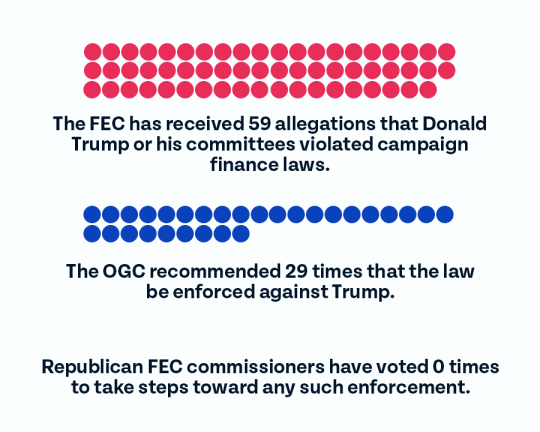
Democratic Vice Chair Ellen Weintraub pointed this out in her December 5, 2023 statement of reasons after the FEC once again failed to garner the votes to enforce the law against Trump after he allegedly violated the law by illegally soliciting or directing money to a pro-Trump super PAC that spent millions on ads opposing Joe Biden in 2020.
Because at least four of the six FEC Commissioners need to approve any FEC investigation, and because only three of those seats can be filled by Democrats, Republicans hold a veto over the agency’s enforcement and have repeatedly used it to shoot down any recommended enforcement of campaign finance law against Trump—and thus successfully shielded him from accountability over and over. Instead of fostering bipartisanship, the split FEC has often become gridlocked and, in cases involving Trump, its ability to pursue action is constrained by the members of one party.

The FEC’s enabling statute, the Federal Election Campaign Act, specifically subjects the Commission’s non-enforcement to review to prevent it from blocking meritorious enforcement. In June 2018, however, two Republican-appointed judges of the D.C. Circuit—including now-Supreme Court Justice Brett Kavanaugh—largely gutted that rule, giving commissioners the authority to block enforcement of the law without judicial review if the commissioners claimed that they did so as an exercise of prosecutorial discretion or under Heckler v. Chaney.
So, in 21 of the 29 cases where the FEC received recommendations to enforce the law against Trump, Republican commissioners justified non-enforcement by invoking prudential or discretionary factors in attempts to circumvent review.
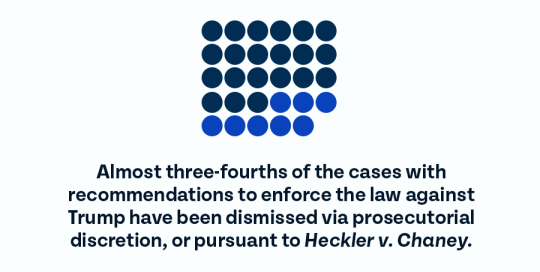
When dismissing the recommendations to investigate Trump—and to kill further inquiries into his actions—the Republican commissioners have at times claimed that the FEC should not take any action because “proceeding further would not be an appropriate use of Commission resources” or that the resources would be “best spent elsewhere.” Trump has even falsely declared that the FEC “dropped” one of its investigations into him “because they found no evidence of problems.” As Commissioner Weintraub wrote in a statement of reasons in November 2023, “the data is clear: At the FEC, Mr. Trump is in a category by himself.”
Unless courts restore their check on partisan vetoes on enforcement, the commissioners will continue to fail to enforce federal campaign finance law against the powerful figures they are trying to protect.
#us politics#news#citizens for responsibility and ethics in Washington#2024#Federal Election Commission#Federal Election Campaign Act#donald trump#conservatives#republicans#gop#Office of General Counsel#campaign finance violations#campaign finance laws#Ellen Weintraub#super pacs#political action committee#Justice Brett Kavanaugh#Heckler v. Chaney
152 notes
·
View notes
Text

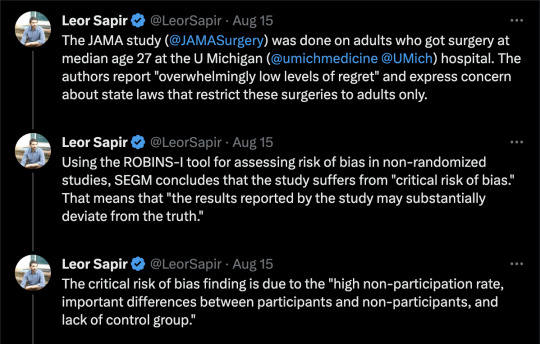
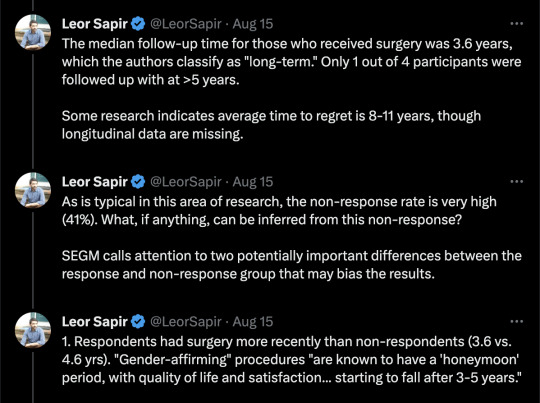


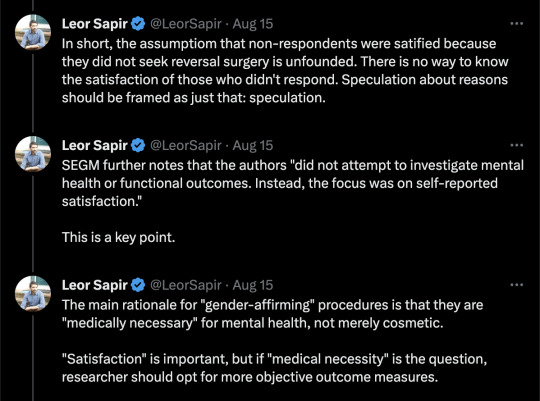


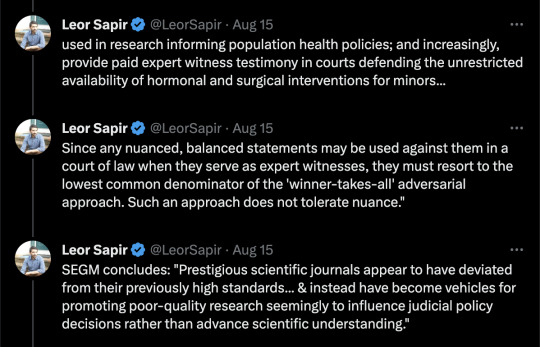


By: SEGM
Published: Aug 13, 2023
Near-zero regret” findings among adults suffer from a critical risk of bias and have low applicability to youth
Recent research published in JAMA Surgery evaluated satisfaction and regret among individuals who had undergone chest masculinizing mastectomy at the University of Michigan hospital. The average patient age at the time of mastectomy was 27 years; no patients who were under age 18 were allowed to participate in the study.
The participants reported high levels of satisfaction and low levels of regret at an average of 3.6 years following mastectomy. The study authors lauded the “overwhelmingly low levels of regret following gender-affirming surgery,” and framed their findings as in conflict with the “increasing legislative interest in regulating gender-affirming surgery,” referring to current legislative attempts to restrict or ban “gender-affirming” procedures for minors. Another group of authors provided an invited commentary on the paper, reinforcing the view held by the study authors, and asserting the presence of a “double standard:” “gender-affirming” mastectomies have come under undue scrutiny by states’ legislators, while other surgical procedures with higher regret rates do not appear to concern legislative bodies.
The study suffers from serious methodological limitations, which render the findings of high levels of long-term satisfaction with mastectomy among adults at a "critical risk of bias"—the lowest rating according to the Risk of Bias (ROBINS-I) analysis. ROBINS-I is used to assess non-randomized studies for methodological bias. The "critical risk of bias" rating signals that the results reported by the study may substantially deviate from the truth. The results also suffer from low applicability to the central issue the study and the invited commentary sought to address, which was whether legislative attempts to regulate “gender-affirming” surgeries are warranted in minors. Unfortunately, these highly questionable findings are misrepresented as certain and highly positive by both the study authors and the invited commentators, several of whom have significant conflicts of interest.
Below, we provide a detailed explanation of the key methodological issues in the study which render its claims untrustworthy and not applicable to the patient population at the center of the debate: youth undergoing gender reassignment. We also comment on the alarming trend: several prestigious scientific journals appear to have deviated from their previously high standards for scholarly work and instead have become vehicles for promoting poor-quality research, seemingly to influence judicial policy decisions rather than advance scientific understanding. We conclude with recommendations about how journal editors can restore the integrity of scientific debate and raise the bar on the quality of published studies in the field of gender medicine.
[ For in-depth analysis, see: https://segm.org/long-term-regret-satisfaction-mastectomy-critical-appraisal ]
SEGM Take-Aways
Although this study reports extremely high rates of satisfaction and low regret, the timeframe in which these outcomes were assessed is insufficient—just 3.6 years post-mastectomy on average. The sample is also highly skewed: 50% of the participants had mastectomies in the last 3.6 of the 30 years. This skewing of the length of time since surgery is expected, given the sharp rise in the number of people (especially adolescents and young adults) identifying as transgender and undergoing chest masculinization mastectomy. It is also a short time in which to assess regret, particularly since one quarter of study participants were younger than age 23 at time of surgery and the median age of first birth in the US is 30 years.
The conclusion of high satisfaction/low regret suffers from a critical risk of bias due to the high non-participation rate, important differences between participants and non-participants, and lack of control group. Problematically, the authors misuse the (critically-biased) results from adults to argue against regulations for irreversible body alternations for minors and do so with a decidedly politicized spin.
The only intellectually honest commentary is that we do not have good knowledge of the likely rates of detransition and regret following chest masculinization mastectomy, nor do we know how many people experience regret but remain transitioned. There is an urgent need for quality research in this area. Previously, detransition and regret rates were considered to be low: they may have indeed been low due to the much more rigorous screenings, or the results may have been biased by the notoriously high dropout rates that plague “regret” research. Regardless, there is now growing evidence of much higher rates of medical detransition.
A recent study from a comprehensive U.S. dataset with no loss to follow-up revealed a 36% medical detransition rate among females within just 4 years of starting hormonal transition. At least two recent studies suggest that average time to regret among recently-transitioned females is about 3-5 years, but there is a wide range. Much less is known about detransition among those who undergo surgery. A growing number of detransitioners now express regret associated with the loss of breastfeeding ability, with one case study detailing breastfeeding grief experienced some 15 years post-mastectomy.
The study and invited commentary exemplify three problematic trends that plague studies emerging from the gender clinics: problematic conflicts of interest of the authors; leveraging scientific journals to disguise politically-motivated pieces as quality research; and a conflicted stance by the gender medicine establishment on surgery for minors. We expand on each briefly below.
Conflicts of interest of study authors and commentators
The significant conflicts of interest of the gender clinicians who study and report on the outcomes of “gender-affirming” interventions cannot be overlooked. These clinicians are conflicted financially, since their practices specialize in “gender-affirming” interventions, as well as intellectually. While conflicts of interest among experts are common, such experts should still attempt to be balanced in their discussions and should acknowledge and reflect on their conflicts of interest.
The interpretations of the data in the study is neither rigorous nor balanced, and both the study and the invited commentary have a decidedly political spin. Further, the invited politicized commentary does not disclose that at least one of the authors is a key expert witness opposing states’ efforts to regulate “gender-affirming” surgeries for minors. This role alone precludes the ability to provide a balanced commentary.
There is a fundamental problem with research emerging from gender clinic settings. The same clinicians provide gender-transitioning treatments to individual patients in their practice; serve as primary investigators and custodians of data used in research informing population health policies; and increasingly, provide paid expert witness testimony in courts defending the unrestricted availability of hormonal and surgical interventions for minors.
As a result, such clinicians cannot express nuanced perspectives. Since any balanced statements may be used against them in a court of law when they serve as expert witnesses, they must resort to the lowest common denominator of the "winner-takes-all" adversarial approach. Such an approach does not tolerate nuance. Unfortunately, this approach contributes to the erosion of the quality of the published work in the arena of gender medicine and accelerates loss of trust about the integrity of the scientific process.
Misuse of scientific publications to promote politically-motivated articles disguised as scientific research
That prestigious medical journals now serve as platforms for promoting misleading, politically motivated research that aims to apply a veneer of misplaced confidence in highly invasive, irreversible treatment should worry everyone committed to evidence-based medicine and the integrity of science. Moreover, it impairs our ability to accurately assess and improve the long-term health outcomes of the rapidly growing numbers of gender-diverse and gender-distressed youths.
This is not the first time that a JAMA has been used as a platform for positioning advocacy for “gender-affirming” care as scientific research. In 2022, JAMA Pediatrics published a study that assessed bodily happiness in a group of subjects aged 14-24 three months after chest masculinization mastectomy. Despite the very short follow up and dropout rate of 13%, the authors argued that their findings supported the premise that there was no evidence to suggest that young age should delay surgery. They also asserted that their research would help dispel the misconception that such surgeries are experimental. The editorial commissioned to bolster the authors claims was descriptively titled, “Top surgery in adolescents and young adults-effective and medically necessary.”
Another troubling trend is the misuse of statistical tools to reframe research findings that contradict the author's own position. For example, a well-known study that claimed that access to puberty blockers reduce the risk of suicide disregarded the fact that individuals reporting use of puberty blockers use had twice as many recent serious suicide attempts as their peers who did not use puberty blockers. Like the finding cited above, the doubling of suicide attempts was not statistically significant due to a small underpowered sample—but the magnitude of the effect was striking and should have tempered the authors’ enthusiastic conclusion that puberty blockers prevent suicides. Another recent gender clinic study, widely and positively covered by major media outlets, claimed that puberty blockers and cross-sex hormones led to plummeting rate of depression—even though the rate of depression among youth taking those medications remained demonstrably unchanged. More information about problems with research originating from gender clinics is detailed in this recent analysis.
Gender medicine’s stance on pediatric surgery
More generally, the gender medicine establishment is in a curious state of internal conflict about its stance on “gender-affirming” surgeries for minors. On the one hand, it has become common for advocates of “gender-affirmation” of minors to insist that surgeries for minors are not performed and anyone who suggests otherwise is spreading “scientific misinformation” and “science denialism.” On the other hand, gender clinicians publish mastectomy outcomes for minors in major medical journals, and laud surgeries for minors as “effective and medically necessary.” It is not uncommon for these opposing claims to be made by the same group of researchers and clinicians, as they test various arguments, searching for the "angle" that is most likely to convince judges and juries--and public at large--that scrutiny of the practice of pediatric transitions, which is increasingly occurring in European countries, is not warranted in the United States.
Notably, none of the European countries that are enacting severe restrictions on the use of puberty blockers or cross-sex hormones for minors have ever allowed surgeries for youth under 18. That the U.S. gender affirmation professionals continue to fight regulation of these problematic procedures speaks volumes about how far the U.S. healthcare has drifted when it comes to "gender affirmation" of minors.
Final thoughts
While it is challenging to determine how best to reduce the temperature of the highly politicized nature of the debate in gender medicine, the editors of scientific journals can begin to restore balance by recognizing how far the field has drifted from the standards of quality scientific research, and begin to expand their circle of peer-reviewers to those with diverse views. Inviting those concerned with the state of gender medicine (and not just the practices’ advocates) into the peer-review and commentary process is the first essential step to improve the quality of research published in the field of gender medicine.
--


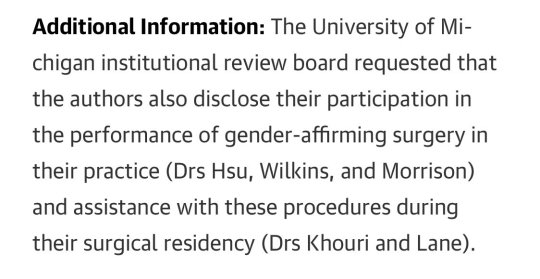
--

==
The activists are predictably - and consistent with the superficiality of their own ideology - upset that anyone should look below the surface. It seems to be more troubling that anyone would notice the shoddiness of the research, than that the research is shoddy.
If this is supposed to be "healthcare," you would think that they would want the best healthcare, and be more alarmed at the misrepresentations of the study, than by people finding those misrepresentations.
Could it be that this is ideological rather than medical? 🤔
The conflicts of interest and funding sources alone are remarkable.
#Leor Sapir#SEGM#Society for Evidence Based Gender Medicine#double mastectomy#top surgery#gender affirming mastectomy#ideological corruption#ideological capture#medical malpractice#conflict of interest#sarcastic font#medical scandal#medical corruption#gender ideology#genderwang#queer theory#gender affirming care#gender affirming surgery#gender affirming healthcare#medical mutilation#sex trait modification#religion is a mental illness
276 notes
·
View notes
Text
Prince Harry was forced to apologise after breaking confidentiality rules in his own High Court case by sharing private information with Johnny Mercer.
Court documents reveal that the Duke of Sussex emailed the veterans minister confidential information concerning his security claim against the Home Office.
The Duke has long shared a close bond with Mr Mercer, with both having served in Afghanistan.
Mr Mercer is a vocal supporter of the Invictus Games and is spearheading the Government’s attempt to host the 2027 event in Birmingham. The pair were photographed drinking pints of beer together at last year’s event in Dusseldorf, Germany.
Mr Justice Lane revealed the Duke’s indiscretion in a costs ruling handed down on Monday concerning his failed application for a judicial review.
He said: “In November 2023, the claimant breached the terms of the confidentiality ring order by emailing certain information to a partner of Schillings, who was not within the confidentiality ring, and to the Rt Hon Johnny Mercer MP.”
The breach was almost immediately detected by the Duke’s own barrister, Shaheed Fatima KC, who promptly informed his solicitor, Jenny Afia, who works for Schillings.
“She in turn informed the defendant (via the Government Legal Department) as well as taking action to minimise the effects of the breach,” the judge said.
The Home Office argued that such breaches, for which the judge said the Duke had apologised, caused it to incur unnecessary costs.
The judge said he did not wish to minimise the “seriousness” of the breach but concluded that it did not have any bearing on the overall determination of costs.
21 notes
·
View notes
Text
The U.S. Supreme Court on Friday agreed to review a decision that revived a long-running lawsuit by the Navajo Nation, which claims that the U.S. Interior Department has a duty to develop plans to provide the reservation with an adequate water supply. The high court granted two petitions for certiorari – one by the federal government, one by Arizona and other states -- challenging last year’s decision by a three-judge panel of the 9th U.S. Circuit Court of Appeals. The 9th Circuit said “an irreversible and dramatically important trust duty” was implied by 175 years’ worth of treaties and court decisions. The challengers, however, say implied rights are unenforceable. “The federal treaties with the Navajo Nation…do not address water at all,” and the doctrine of implied water rights “cannot justify imposing such a fiduciary duty,” lead counsel Rita Pearson Maguire argued in the states’ cert petition. The Interior Department, represented by Solicitor General Elizabeth Prelogar, added that the 9th Circuit’s approach would replace national policy decisions with “a regime of general judicial oversight of the United States’ relationship with Indian tribes.” The Navajo Nation, represented by Shay Dvoretzky of Skadden, Arps, Slate, Meagher & Flom, defended the 9th Circuit’s decision and urged the high court to deny certiorari. The Interior Department declined to comment on Friday. Maguire and Dvoretzky did not immediately respond to requests for comment. The Navajo Nation filed suit in 2003. It wants the Interior Department to determine whether the Little Colorado River, which runs through the reservation, is sufficient “to fulfill the Reservation’s purpose of establishing a permanent homeland for the Nation” – a standard known as Winters rights, from a 1908 U.S. Supreme Court decision. If not, the Nation says the government must develop a plan to supply water from other sources. A federal judge in Prescott, Arizona,
ICWA is not the only case affecting Native American and Alaska Native rights. Keep an eye on this case.
279 notes
·
View notes
Text
Docket Adjacent Update: Telegraph: Prince Harrys failed bid to get police protection back cost taxpayer over 500000 by u/Von_und_zu_
Docket Adjacent Update: Telegraph: Prince Harry’s failed bid to get police protection back cost taxpayer over £500,000
https://ift.tt/qZwVHLn Ward in the Telegraph:Prince Harry’s failed legal bid to overturn a Home Office decision to deny him the right to automatic police protection cost the taxpayer more than £500,000, the Telegraph can reveal. The cost to the public purse will likely raise questions about the merits of a member of the Royal family taking legal action against the Government. Figures released via a freedom of information request reveal that the total cost of fighting two separate judicial review claims lodged by the Duke of Sussex over his security reached £514,128. That included more than £180,000 for counsel, £320,000 for the Government Legal Department, £2,300 in court fees and almost £10,000 in e-disclosure. Mr Justice Lane dismissed the Duke’s case in a scathing 52-page ruling handed down in February after two-and-a-half years of legal wrangling. He ruled that the decision made by the Royal and VIP Executive Committee (Ravec) to withdraw state-funded security for the Duke and Duchess of Sussex when they stepped back as working royals and instead review it on a case by case basis whenever they return to the UK had not been irrational or procedurally unfair. He also rejected the Duke’s “inappropriate, formalist interpretation” of the process and said that taxpayer-funded security should not be used to protect the Duke and Duchess from paparazzi. The ruling left the Duke facing an estimated legal bill of more than £1 million. Undeterred, he has announced that he plans to appeal the ruling, meaning that the costs are likely to rise further. I would like to know whether he will be called upon to pay these costs, in addition to his own.
post link: https://ift.tt/iNq67c4
author: Von_und_zu_
submitted: March 27, 2024 at 05:34PM via SaintMeghanMarkle on Reddit
disclaimer: all views + opinions expressed by the author of this post, as well as any comments and reblogs, are solely the author's own; they do not necessarily reflect the views of the administrator of this Tumblr blog. For entertainment only.
#SaintMeghanMarkle#harry and meghan#meghan markle#prince harry#fucking grifters#Worldwide Privacy Tour#Instagram loving bitch wife#Backgrid#voetsek meghan#walmart wallis#markled#archewell#archewell foundation#megxit#duke and duchess of sussex#duke of sussex#duchess of sussex#doria ragland#rent a royal#clevr#clevr blends#lemonada media#archetypes with meghan#invictus#invictus games#Sussex#WAAAGH#american riviera orchard#Von_und_zu_
18 notes
·
View notes
Text
Home Office Yields in Latest Challenge to 'No Recourse to Public Funds' Rule
The Home Office has recently yielded to another in a series of ongoing challenges to the no recourse to public funds policy. This particular challenge involved the removal of the no recourse condition for an individual with section 3C leave as a student dependent. The case in question is PA & Anor, R (on the application of) v Secretary of State for the Home Department [2023] EWHC 2476…

View On WordPress
#ukimmigration#3C Leave#Child#Child dependent#Child Visa#David J Foster & Co#dependants#Dependent Visa#DJF Solicitors#Home Office#Immigration#Immigration Judicial Review#Judicial Proceedings#Judicial Review#Judicial Review Claim#Judicial Review Hearing#Lexvisa#Marriage#no recourse to public funds#Section 3C#Section 3C Leave#Student#student dependant#welfare#Without Recourse to Public Funds
0 notes
Text
How He Gives A Speech (The Brothers)
Headcanon
Ft. The Demon Brothers
C/W: mention of lack of confidence, self-doubt, murder. A bit politics, but no political position mentioned.
No proofread
Preface. We all know the Seven Demon Brothers (with Diavolo) form the government of the whole Devildom. They act as the supreme legislative, executive, & judicial organization of Devildom. We also know politicians must give a speech from time to time. So here’s a headcanon of how each of the Brothers give a speech.

LUCIFER
After coming up to the lectern, before giving a speech, Lucifer will take his glasses out and put them on in front of all the demons. This makes him look sophisticated. (Show off 😒)
The Avatar of Pride does memorize his speech. But he writes it all down in case of he forgets what goes next. And Lucifer brings the paper to the lectern. Again, it makes him look classy.
Lucifer calculates his speech very carefully. Using the calculated words, he steers the public opinion in the direction he wants. Because Lucifer’s speech is considered carefully, it’s very hard to challenge his opinion. Challenge him and you may find yourself embarrassed publicly.
During the speech, Lucifer makes sure to look at the main targeted audience in the eyes, making them feel he is sincere about their well-being. Whether it is true or not is up to debate.
If you are among the audience, Lucifer’s gaze makes sure to linger on you longer than the others. In that moment, his gaze became soft, truly and sincerely full of love.
While human prime ministers struggling to stay in office for 10 years, the Prime Minister of Devildom has been unchanged for more than 1000 years. Really, none could claim to be a better politician than Lucifer.

MAMMON
Mammon may mess up a lot. But as long as he prepares carefully, his speech will be fine.
Lucifer usually tasks Mammon with speech on helping the needy, like orphan. Because Mammon gets emotional during the speech, which in turn gains a lot of sympathy and support from the audience.
Mammon’s opponents may denounce those emotional moments as fake and “trying to gain political support”. But those who know Mammon truly won’t be deceived by those nasty political comments.
When strangers falsely criticize him, please be his moral support, MC!

LEVIATHAN
Levi messes up a lot during a speech, because the third born can feel all the pressure on him from all those eyes.
That is why Lucifer assigns Levi to deliver military speech only.
When delivering a speech to his sailors, Levi enters his Grand Admiral mode.
Levi’s speech is short and concise, but arouses strong emotions in his subordinates. It always ends up with an united battle roar from all the sailors. The roar is so strong that normal demons could feel earth shaking.
Beside from military speech, Levi can also deliver an otaku speech. To outsiders, it’s boring. But to fellow otakus, the speech ignites the flame of otaku’s spirit.
Make sure to support him and lift him up from his unredeemable self-doubt, MC!

SATAN
Satan’s speech, to his own displeasure, bears many similarities to Lucifer. Shhh…he knows but don’t tell him that. The last time a demon points it all, they were torn apart into 800 pieces.
But one notable difference is that Satan doesn’t try to show off like Lucifer. Sure, he has the papers for practical purpose, but he doesn’t put on his glasses in front of so many demons.
Satan has many influential acquaintances, he’s usually invited to give a short speech at meetings of some clubs or organizations.
Cat-related associations have Satan as their regular speaker.

ASMODEUS
The beautiful demon uses his charm a lot during a speech, bending the public opinion to his will. So much that Diavolo and Lucifer has to limit his influence.
Well, that was the case before when Asmo wasn’t too confident in his speech (the limitations are still in practice tho). Nowadays, Asmo has become more confident and uses his speech mainly on reviewing beauty products and the importance of self-care.

BEELZEBUB
Lucifer has to make sure Beel’s partially full before the speech, because his stomach will rumble a lot, interrupting the speech, and the rumble will become the main topic of public discussion rather than the speech.
Well, there’s a second method. You have to give him an intimate moment (a kiss perhaps) before the speech. Beel’s hunger will be satisfied temporarily. But beware, the downsize of this method is that Beel may rush the speech to return by your side.
Beel’s voice gives a warm feeling. And he usually talk about the importance food and meals, nutrient, and sport - a balance and healthy life. It’s a very popular topics among demon mothers.
If Beel’s opponents try to defame him, they will receive backlashes from Beel’s loyal audience, who happen to be their wives, mothers, partners, etc.

BELPHEGOR
Speech? What speech? What are you talking about, MC? The seventh born completely forgot he was supposed to give a speech. And good Lord, Lucifer is furious every time this incident happens again. The eldest orders Belphie to bear the consequences and fix the problem.
Belphie proceeds to…sleep.
But worry not. The Avatar of Sloth conjures a dream where he gathers the audience and gives the most powerful speech ever, since he gives himself [Persuasion] and [Convincing] at max in the dream he created.
The audience wakes up after a long night, subconsciously influenced by Belphie’s speech.

Get the inspiration like…yesterday or last week seeing politicians playing politics XD
P.S. if you love this, please reblog because it helps my blog. Thanks :3
#obey me#omswd#obey me shall we date#obey me headcanons#obey me headcanon#obey me lucifer#obey me mammon#obey me leviathan#obey me satan#obey me asmodeus#obey me beelzebub#obey me belphegor#obey me demon brothers#obey me x reader#obey me one master to rule them all#obey me lucifer x reader#obey me mammon x reader#obey me leviathan x reader#obey me satan x reader#obey me asmodeus x reader#obey me beelzebub x reader#obey me belphie x reader
318 notes
·
View notes
Text

Mike Luckovich
* * * *
Jack Smith calls the question.
December 12, 2023
ROBERT B. HUBBELL
Monday brought multiple positive developments for those who yearn for the courts to serve as a bulwark against Trump's effort to assume dictatorial powers. Let’s review the threads of hope that run through the judicial developments on Monday relating to Trump.
Jack Smith goes directly to the Supreme Court on the question of Trump's presidential immunity defense in the D.C. election interference case.
Trump's primary defense against the 91 federal indictments secured by Jack Smith is delay. His claim of presidential immunity for all acts undertaken as president is not a serious defense but is structured to create delay. It is one of the few defenses that can lead to a pre-trial appeal—and lengthy delay of trial.
Judge Chutkan denied Trump's motion to dismiss the D.C. election interference case, and Trump appealed to the D.C. Circuit. After the D.C. Circuit rules, the matter can go to the Supreme Court. Even with expedited briefing in both the D.C. Court of Appeals and the Supreme Court, that process might delay Trump's criminal trial until after the 2024 election.
Everyone knows that Trump's claim of presidential immunity will eventually end up in the US Supreme Court, so Jack Smith called the question on Monday by asking the Supreme Court to take the case without an intervening stop in the D.C. Circuit. The procedure invoked by Smith has been used in extraordinary cases—including US v. Nixon.
The historical background is discussed by Lucian K. Truscott IV in his excellent Substack newsletter. See Lucian K. Truscott IV, It's called the Nixon rule, and the Supreme Court should uphold it without delay (substack.com). I highly recommend Truscott’s analysis—so much so that I will assume you have (or will) read it so that I can skip some of the details he ably covers.
Jack Smith’s petition is here: U.S. v. Donald J. Trump | Petition for Writ of Certiorari Before Judgment.
Before addressing Smith’s petition, let’s skip to the end: Smith has undertaken a bold, brilliant, gutsy move that prioritizes the interest of the American people in knowing whether the leading GOP presidential candidate is a criminal before they are asked to vote for (or against) him in November 2024.
Smith is, of course, taking a gamble by front-loading the ‘overwhelming question’ that will determine whether Trump is above the law. Framed as a two-part question by Jack Smith in his petition, he asks the Supreme Court to decide the following:
Whether a former president is absolutely immune from federal prosecution for crimes committed while in office, or
Is constitutionally protected from federal prosecution when he has been impeached but not convicted [in the Senate] before the criminal proceeding begins.
The answer to those questions is plainly “No.” The questions posed by Smith can be reframed as, “In America, is any person above the law?” Again, the answer is plainly “No.”
Given that Trump's defense is meritless and should be summarily rejected, Jack Smith’s petition poses the following question to the Supreme Court:
Will the US Supreme Court aid and abet Trump's effort to overturn the 2020 election by delaying his trial until after the 2024 election—preserving the possibility that Trump will dismiss the prosecutions against himself if he is elected?
Stripped to its essence, Jack Smith is challenging the Supreme Court to put its legitimacy and legacy on the line. Indeed, he is offering the Court the opportunity for partial rehabilitation. If they decline that opportunity, the justices will deserve the judgment of history that would follow a refusal to consider the matter on an expedited basis and rule that “No person is above the law.”
Let’s now look at the procedural posture of the petition. Jack Smith is asking for two forms of relief: (a) to skip over the D.C. Court of Appeals by granting a “writ of certiorari” (a fancy word for appellate review), and (b) that the Supreme Court grant review on an expedited basis.
In a positive sign, the Supreme Court ordered Trump to respond to Smith’s request for expedited review on Wednesday, December 20, 2023. As explained by Professor Tribe on Lawrence O’Donnell’s “The Last Word,” the fact that the Supreme Court ordered Trump to file on an opposition on an expedited basis suggests that there are five votes on the Supreme Court to grant Jack Smith’s request for expedited review.
If the Supreme Court is inclined to grant expedited review, that is a very good sign. It suggests that Trump will be tried for election interference before the November 2024 election. Although a conviction is not guaranteed, Jack Smith will present evidence of Trump's guilt on the eve of the 2024 election. That is all we can ask for.
But there is more good news. As Jack Smith was filing his petition with the Supreme Court, the D.C. Circuit Court of Appeals also indicated that it would move expeditiously by granting Smith’s separate motion for an expedited hearing before the D.C. Circuit. On Monday, the D.C. Circuit ordered Trump to file a response by Wednesday, December 13, in opposition to Smith’s request for an expedited hearing in the D.C. Circuit.
Here is the way to think about the dual proceedings in the D.C. Circuit and the Supreme Court. Unless and until the Supreme Court grants Jack Smith’s petition for a writ of certiorari, the D.C. Circuit retains jurisdiction over the case. If the Supreme Court grants Smith’s petition, the D.C. Circuit loses jurisdiction; if it denies Smith’s petition, the D.C. Circuit retains jurisdiction.
In effect, Smith is on “two fast tracks” to review Trump's defense of presidential immunity. He has hedged his bets and called the question. Good!
#Robert B. Hubbell#Robert B. Hubbell Newsletter#Jack Smith#SCOTUS#expedited review#D.C. Circuit Court of appeals#legal#Rule of Law#Democracy
24 notes
·
View notes
Text
Barely a day after former President Donald Trump was indicted for the third time, some Senate Republicans are already trying to undermine the credibility of the federal judge who was randomly assigned to preside over his trial.
Here’s a detail they’re hoping you won’t notice: They unanimously voted to confirm her.
Sen. Ted Cruz (R-Texas), speaking on his podcast on Wednesday, accused U.S. District Judge Tanya Chutkan of being “relentlessly hostile” to Trump and claimed that she has “a reputation for being far-left, even by D.C. District Court standards.”
But Cruz voted to put Chutkan into her seat on the U.S. District Court for the District of Columbia in June 2014. So did every other Senate Republican when she was unanimously confirmed, 95-0.
That includes Sen. Lindsey Graham (R-S.C.), who nonsensically claimed Wednesday that “any conviction in D.C. against Donald Trump is not legitimate.”
“The judge in this case hates Trump,” Graham said in a Fox News interview. “You can convict Trump of kidnapping Lindbergh’s baby in D.C. You need to have a change of venue. We need a new judge. And we need to win in 2024 to stop this crazy crap.”
Aides to Cruz and Graham did not respond to requests for comment on how the senators square their votes to confirm Chutkan with their criticisms of her ability to be a fair judge.
Tuesday’s federal indictment of Trump accuses him of serious crimes related to the 2020 presidential election and the Jan. 6, 2021, Capitol insurrection: conspiracy to defraud the United States, conspiracy to obstruct an official proceeding, obstruction of and attempt to obstruct an official proceeding, and conspiracy against rights.
Chutkan, a Jamaica-born former assistant public defender and an appointee of former President Barack Obama, has already been overseeing cases related to the Jan. 6 attack. She’s handed out some of the most aggressive sentences yet to rioters who took part in the violence that day. Of the 11 cases that have come before her, she imposed tougher sentences than those sought by the Justice Department seven times and matched what the Justice Department was seeking four times, according to an Associated Press review.
In all 11 cases, Chutkan sentenced the defendants to prison time.
This is what is likely driving the GOP attacks on Chutkan: They know she’s not likely to go easy on Trump now.
Beyond trying to discredit the judge, some Republicans, like Graham, are parroting Trump’s absurd demand for a change of venue. The former president has called for moving his case to the “more diverse” and “politically unbiased nearby State of West Virginia!” (Virginia and Maryland are much closer to D.C., for what it’s worth.)
Not a single Republican raised concerns about Chutkan during her nomination hearing in the Senate Judiciary Committee in February 2014. In fact, only one GOP member of the committee even showed up to the hearing: Sen. John Cornyn (Texas), who was only there to rave about a separate Texas judicial nominee on the schedule. He left before Chutkan was up.
Cruz and Graham were both members of the committee at the time.
Neither attended Chutkan’s hearing.
#us politics#news#huffington post#republicans#conservatives#donald trump#2023#capitol protests#capitol riot#capitol riot investigation#jan 6 investigation#jan 6 insurrection#sen. ted cruz#Judge Tanya Chutkan#U.S. District Court for the District of Columbia#us senate#sen. lindsey graham#conspiracy to defraud the United States#conspiracy to obstruct an official proceeding#obstruction of congress#attempt to obstruct an official proceeding#conspiracy against rights#the associated press#West Virginia#Senate Judiciary Committee#Sen. John Cornyn
252 notes
·
View notes
Text
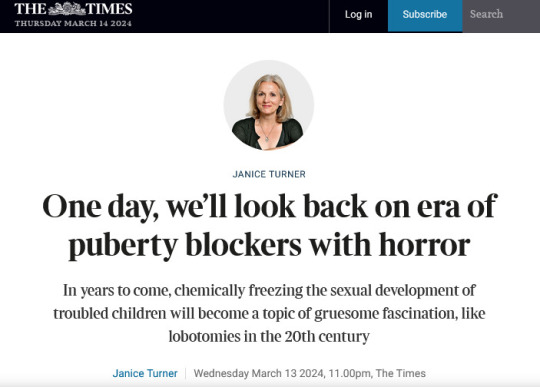
In 2017 I interviewed Bernadette Wren, then head of psychology at the Tavistock Gids clinic, and asked what effect puberty blocking drugs have on the adolescent brain. Looking highly uncomfortable, she replied that the evidence so far was only anecdotal but that the clinic would study its patients “well into their adult lives so that we can see”.
Even back then, before whistleblowers had exposed the rush to medically transition children, it was alarming to hear that heavy-duty GnRH agonists such as triptorelin — used to treat advanced prostate cancer and “chemically castrate” sex offenders — were being prescribed to arrest puberty in hundreds of children as young as 11.
Moreover, they were being used “off-label” before any clinical trials. And the long-term study Wren promised never materialised: Gids (the Gender Identity Development Service) routinely lost touch with patients, and the 44 it did follow reported little long-term mental health improvement.
This shocking chapter in medical history, where the ideological objectives of trans rights campaigners trumped the welfare of disturbed children, is coming to an end worldwide. The decision by NHS England effectively to ban the prescription of puberty blockers comes after the Cass review noted these drugs could “permanently disrupt” brain development, reduce bone density and lock children into a regime of cross-sex hormones requiring life-long patienthood.
NHS England unites with other national health services including those in Finland, France, Sweden and, most notably, the Netherlands — where the “Dutch protocol”, a regime of early blockers then hormones, was devised in 1998 — in pulling back from prescribing them.
Even in the United States, where a toxic combination of extreme activism and medical capitalism has pushed child gender medicine to grotesque extremes, with double mastectomies performed on 14-year-old girls, there is some retrenchment.
Leaks from the World Professional Association for Transgender Health, the body which formulates guidance on “trans healthcare”, reveal doctors perplexed at how they should explain to an 11-year-old child that drugs will render them infertile. Crucially, liberal media such as The New York Times are now reporting grave medical misgivings about child transition, once dismissed as a culture-war issue for the Republican right.
Yet the question remains: how was this ever allowed to happen? For years, puberty blockers were cheerily billed as a mere “pause button”. In 2014, Dr Polly Carmichael, the last head of Gids before the Cass review ordered its closure, went on CBBC in a show called I Am Leo, saying of blockers: “The good thing is, if you stop the injections, it’s like pressing ‘start’ and the body carries on developing as it would if you hadn’t started.”
The BBC permitted her to make this unevidenced claim to an impressionable audience of six to 12-year-olds. Imagine hearing this as a developing girl, freaked out by your new breasts and periods. No wonder Gids referrals subsequently rocketed.
Carmichael failed to mention that she did not know if pressing “restart” on puberty is always medically possible — it is not — and in fact, almost every child Gids put on blockers went on to irreversible cross-sex hormones.
After years in a Peter Pan state while their peers developed, they understandably felt there was no way back and forged on with treatment. Yet if allowed to experience natural puberty, almost 85 per cent of gender dysphoria cases resolve themselves.
Nor did Carmichael tell CBBC kids that the blockers-hormones combination, if taken early enough, not only results in sterility but kills the libido so that a young person will never experience an orgasm.
At the 2020 judicial review brought by a former Tavistock clinician and Keira Bell, the brave young detransitioner rushed onto hormones by Gids, judges expressed astonishment at Gids’s lack of an evidence base.
Reporting on this issue for seven years, I too have been struck by a complete clinical incuriosity. Not only was data not collected, but those who queried treatments or pressed for evidence faced angry condemnation. Perhaps activists knew what research might find because one long-term Finnish study, recently reported in the BMJ, destroyed the myth used to justify blockers: that a child will commit suicide if denied them.
The Finns found that “gender-affirming care” does not make a dysphoric child less suicidal. Rather, such children had the same suicide risk as others with severe psychiatric issues. In other words, changing bodies does not fix troubled minds.
Yet even after NHS England’s announcement, activists refuse to heed the now-overwhelming evidence. In its response, Stonewall persists with the myth that puberty blockers “give a young person extra time to evaluate their next steps”.
Many questions remain unanswered: will private clinics still be permitted to prescribe puberty blockers; and is Scotland’s Sandyford child gender clinic still determined to close its ears to all evidence? Plus, we have few details on how the NHS’s new “holistic” treatment for gender-questioning children will operate when it opens next month.
This repellent experiment — in which girls who like trucks or little boys who dress as princesses, and who invariably grow up to be gay, are corralled inexorably down a road towards life-changing treatments — belongs in the book of medical disgraces. As do the cheerleaders who raised money for Mermaids and those who persecuted whistleblowers or damned journalists asking questions as transphobic.
In 50 years, chemically freezing the puberty of healthy children with troubled minds will be regarded with the same horrified fascination as lobotomies — which, never forget, won the Portuguese neurologist Antonio Egas Moniz the 1949 Nobel prize.
--------------------
{Article source (behind paywall)}
17 notes
·
View notes
Text
By Jon Queally
Common Dreams
May 05, 2023
U.S. Supreme Court Justice Clarence Thomas and his wife Ginni Thomas are under fresh scrutiny as yet another revelation, this one reported by the Washington Post on Thursday evening shows Ginni received tens of thousands of dollars in off-the-book compensation from a powerful right-wing nonprofit shortly before the group "soon would have an interest before the court"—a pivotal voting rights case.
Based on documents reviewed by the Post, right-wing judicial activist Leonard Leo used his role as an advisor to the nonprofit, the Judicial Education Project, to ask GOP pollster Kellyanne Conway, later a top aide to President Donald Trump, to pay Ginni Thomas a large sum but keep her name off the financial records.
"Leo, a key figure in a network of nonprofits that has worked to support the nominations of conservative judges," the reporting explains, "told Conwaythat he wanted her to 'give' Ginni Thomas 'another $25K,' the documents show. He emphasized that the paperwork should have 'No mention of Ginni, of course.'"
"Leonard Leo has written the definition of court corruption. These shady schemes are a call to action to bring about ethics reform at the highest levels of the judiciary." —Kyle Herrig, Accountable.US
In response to the new revelations, Kyle Herrig, president of the public interest advocacy group Accountable.US, said "Leonard Leo has written the definition of court corruption. These shady schemes are a call to action to bring about ethics reform at the highest levels of the judiciary."
In defense of the secrecy of the payments to Ginni Thomas's firm—which according to the Post totaled $80,000 between June 2011 and June 2012, but may have been more overall—Leo said in a statement to the newspaper that it was necessary to keep her name out of any disclosures because of how "disrespectful, malicious and gossipy people" can be in the political sphere.
"I have always tried to protect the privacy of Justice Thomas and Ginni," Leo claimed.
"Each day that passes, the Supreme Court is looking less like a bench and more like an auction house. Thomas should resign immediately..." —Congresswoman Alexandria Ocasio-Cortez
Crucially, months after these payments were made to Ginni Thomas, the Judicial Education Project filed an amicus brief in the case Shelby County v. Holder, taking the side of those opposed to a key provision in the Voting Rights Act of 1965. As the Post notes:
The court struck down a formula in the Voting Rights Act that determined which states had to obtain federal clearance before changing their voting rules and procedures. Clarence Thomas was part of the 5-to-4 majority.
Thomas issued a concurring opinion in the case, arguing that the preclearance requirement itself is unconstitutional. Thomas's opinion, which was consistent with a previous opinion he wrote, favored the outcome the Judicial Education Project and several other conservative organizations had advocated in their amicus briefs. He did not cite the Judicial Education Project brief.
But progressive political observers said the corruption was impossible not to see—especially given the wave of revelations about lavish gifts and financial arrangements between Justice Thomas and billionaire Harlan Crow, a right-wing mega-donor.
"This is corruption. Plain and simple," said Rep. Alexandria Ocasio-Cortez (D-N.Y.) in reaction to the latest revelation. "And each day that passes, the Supreme Court is looking less like a bench and more like an auction house. Thomas should resign immediately and Roberts should see to it that he does."
Read more.
#ginni thomas#leonard leo#voting rights act#clarence thomas#kellyanne conway#aoc#u.s. supreme court#corruption#ethics#shelby county v. holder
71 notes
·
View notes
Text
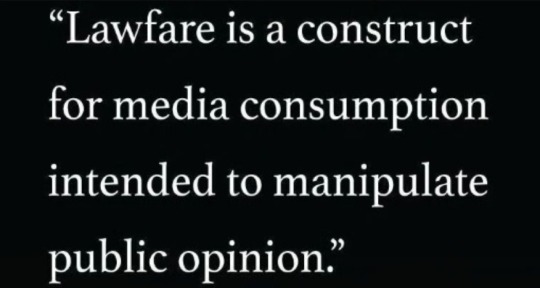
President Trump Special Counsel “Election Interference Case” in DC Suspended Indefinitely

February 2, 2024
In the ridiculous federal election interference case in D.C., President Trump’s attorneys argued to the DC Circuit appellate court that President Trump holds inherent constitutional immunity. In essence, because President Trump was acquitted by the Senate of claims he incited or instigated the January 6, 2021, events, lawyers arguing under the constitution that only impeached and removed presidents can be criminally prosecuted.
From the Comments:
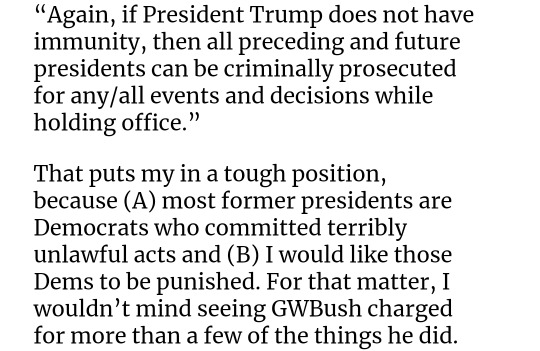
The initial 3-judge panel of the court has taken up the appeal, and all subsequent lower court activity was suspended until the constitutional issue is resolved. Again, if President Trump does not have immunity, then all preceding and future presidents can be criminally prosecuted for any/all events and decisions while holding office. This is a core issue, and the DC Circuit Court of Appeals has to tread very carefully with these ramifications at the forefront.
The decision of the 3-judge panel could also be followed by a full en-banc review by all judges in the circuit. Then, depending on their decision, it could -likely will- go even higher to the U.S. Supreme Court. All of this takes time, and the initial 3-judge appeals court have not provided any hints on their timeline.
Apparently, as a consequence, the entire trial of the case has been removed from the lower DC court docket. The removal took place within the last few days, and the Washington Post noticed the removal. This removal means the timing of the case, if at all, is completely unknown now.

WASHINGTON – Former president Donald Trump’s March 4 trial date on charges of plotting to overturn the results of the 2020 election has been dropped from the public calendar of the federal court in Washington, a sign of what has long been anticipated — that his claim of presidential immunity from criminal prosecution would delay his trial while it remains on appeal.
The change did not appear on the official criminal case docket before U.S. District Judge Tanya S. Chutkan, who has made clear since Trump filed his appeal on Dec. 7 that all trial deadlines would be suspended while he challenges the case. On appeal, Trump is arguing that the government does not have authority under the Constitution to bring charges against him for actions he took while president after the 2020 election through the Jan. 6, 2021. (read more)
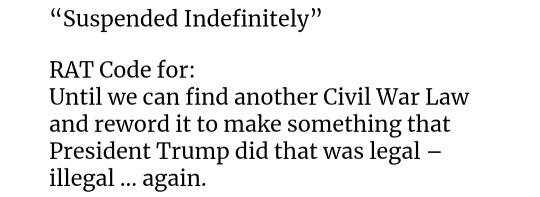
In addition to the challenges within these core issues, the Lawfare approach by Jack Smith, Mary McCord and Andrew Weissmann, faces multiple additional hurdles. These are all issues that surface when Lawfare, the application of twisted legal theory intended to manipulate public opinion, runs into the reality of ever-increasing scrutiny from courts.
Combine these fraudulent legal theories with the reality that President Trump’s status is almost certainly “presumptive presidential nominee” in the eyes of the entire judicial branch, and things change. The pretending justification for the Lawfare claims now hit the non-pretending and visible reality of political intent.
The judicial scrutiny gets even more focused, and the explanations demanded as justifications to target President Trump increase. As the calendar of the November election gets closer Jack, Mary and Andrew will have to rely on ideologically aligned black robes to maintain their Lawfare pretense. Some of the robes will not be comfortable with the demands of Jack, Mary and Andrew.
Some of the robes may not pretend, and that poses a problem for Jack, Mary and Andrew.
14 notes
·
View notes
Text
By: Jo Bartosch
Published: May 3, 2023
Twenty years ago, after one too many beers, I met some pagans in a pub in Gloucestershire. They invited me to travel with them to Ireland the next morning on a spiritual pilgrimage. I expected a mystical experience, but I remained unmoved. On returning to Ireland last week to attend two rival conferences on how best to help people distressed about their gender, I realised that my scepticism is still intact – and that mad beliefs about magic have spread far beyond damp hippies.
The two conferences were very different. The larger, more established conference was organised by the European Professional Association for Transgender Health (EPATH), which claims to promote the ‘mental, physical and social health of transgender people in Europe’. The other conference was organised by a relative upstart called Genspect. Founded in 2021, Genspect is an international organisation that aims to ‘promote high-quality, evidence-based care for gender-nonconforming individuals all around the world’.
In a press release from March, Genspect’s director, psychotherapist Stella O’Malley, summed up the difference between the two organisations’ approaches when dealing with those experiencing gender distress: ‘The EPATH programme promotes heavy medical interventions while Genspect favours the least-invasive approach first.’ Genspect, explained O’Malley, aims to ‘crack open EPATH’s mono-focus on medicalised modes of treatment’.
The Genspect conference set out to challenge both the magical thinking of trans ideology and the medicalisation of childhood distress that this has led to. This was reflected by the presence of around a dozen ‘detransitioners’ among the delegates – that is, people who regret transitioning and want to revert to their original gender. These detransitioners, who were predominantly under 30, are now living with the consequences of taking hormones and having their healthy body parts amputated. In time, they might recover their mental health. But in many cases the harm done to their bodies will be permanent.
Michael Biggs, an associate professor in sociology at the University of Oxford, has long been investigating the effect of puberty-blocking drugs on sexual maturation. Presenting his findings at the Genspect conference, Biggs revealed that patients who have suppressed their puberty as children before surgical transition may never be able to orgasm as adults.
Speaking after the conference, Biggs told me that there is a wilful lack of published research on the long-term effects of taking puberty blockers. He said that ‘puberty blockers have been used in the Netherlands for over three decades, and yet the long-term effects are known for only one person’. By the age of 35, that ‘one person was depressed and ashamed of their genitals’.
Biggs also revealed that where research has been carried out into puberty blockers there have been attempts to suppress it. The NHS’s Gender Identity Development Service (GIDS) at London’s Tavistock clinic, which is due to be closed down later this year, began a study of 44 children aged between 12 and 15 in 2011. But GIDS director Dr Polly Carmichael effectively kept the results of this trial to herself. The findings remained unpublished until they were discovered and first analysed by Biggs in 2018. ‘It required a complaint to the Health Research Authority, questions in parliament, and a judicial review’, Biggs tells me, ‘before Dr Carmichael finally published the full results’.
Most disturbingly, Biggs told me of the awful fate of one healthy Dutch teenager. After having his puberty blocked as a child, the teenager underwent a vaginoplasty aged 18. The complicated procedure involved taking tissue from his bowel to create a replica vagina and vulva. Within 24 hours of having surgery, he had died in hospital of necrotising fasciitis.
Predictably, EPATH’s conference featured no such criticism of these surgical or medical interventions. Far from it. The conference was even spon.sored by a company offering facial-feminisation surgery, and from the off EPATH went on the offensive. In the opening address, the organisation’s outgoing president, Joz Motmans, attacked ‘anti-gender and anti-trans voices, legislation, policies and movements’. Motmans even claimed that the growing public scepticism towards trans ideology was driven by ‘far-right parties’. ‘We respect everyone’s freedom of speech’, he said, ‘but we choose not to listen to it’.
In the interests of actual free speech and debate, EPATH attendees were told that they would be permitted access to Genspect with their EPATH ticket. This gesture was not reciprocated. Indeed, EPATH has even blocked Genspect from its Twitter account.
Whether or not EPATH chooses to listen, the debate over how best to treat patients with gender distress is gaining momentum across Europe. Last year’s announcement that the Tavistock clinic would be shut down, on the grounds its model of care is ‘not safe’ for children, has sent shockwaves across the continent. Medical bodies are now sounding the alarm in Sweden, France and most recently Norway. More and more clinical professionals are coming out to ask for the evidence that mental distress can be successfully treated by ‘gender-affirming’ medical interventions.
Last week in Ireland, the authority of EPATH’s gender priests took a battering. They showed themselves to be unwilling and perhaps even incapable of engaging with those who hold opposing views. More damning still, they refused to engage with the evidence.
Trans ideology is now being exposed for the magical thinking it always was. Its adherents are doing real harm.
==
Telling people to get a facelift or a boob-job when they're depressed or anxious used to be regarded as unethical.
Now it's a moral imperative.
#Jo Bartosch#gender ideology#queer theory#EPATH#Genspect#genderwang#gender affirming#affirmative therapy#affirmation model#puberty blockers#medical experimentation#sex trait modification#wrong sex hormones#cosmetic surgery#medical scandal#medical malpractice#medical transition#denial#magical thinking#religion is a mental illness
50 notes
·
View notes